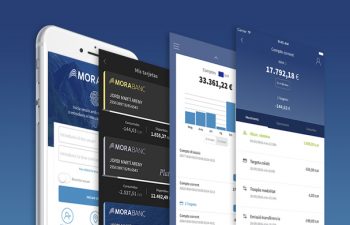Five concepts to understand digital transformation in banking and financial services
Experts | 06.19.2017

The digital revolution and/or disruption in banking and other financial services like insurance and online payments are popular topics in traditional and digital newspapers.
All these articles are peppered with new words, many of them Anglicisms. Many are unfamiliar with this terminology, and in this post we aim to explain some of these expressions to give you a better understanding of the new world of digital finance.
1. Neobanks: digital companies that offer retail banking services without holding a banking license, which is why they partner with existing physical or digital banks that do. Examples: Moven, Simple, Starling Bank.
2. Challenger Banks: digital companies that offer retail banking services and have a banking license. They are true digital banks. Examples: N26, Atom, Fidor Bank, Tandem.
3. Fintechs: digital companies that operate in different areas or niches of financial service markets:
• Crowdlending, Crowdfunding and Collective Funding: these are digital platforms that offer financing to individuals, companies or projects. Examples: Loanbook, Arboribus, Kickstarter.
• Digital Payments: digital companies that offer online payment services between private individuals or between private individuals and companies or who specialize in small payments. Examples: Square, Stripe.
• PFM (Personal financial management): digital companies that offer financial management services that help customers manage their daily expenses, budgets, define expenditure-reduction objectives and savings. Examples: Strands, Fintonic, Mooverang.
• Investment & Wealth Management: companies that offer financial and investment advice through robotics and artificial intelligence, offering currency exchange through digital platforms. Examples: Finametrics, Finizens, T-Advisor, Kantox.
• Bitcoins and Blockchain: companies that use cryptocurrency like the Bitcoin through new blockchain technologies that allow money and information to be exchanged without the need of financial intermediaries. Examples: CoinBase, BitPay.
4. Insurtechs: digital companies that operate in different areas or niches of the general or life insurance market or new business models, such as peer-to-peer (P2P) insurance in which a pool of people come together to provide direct insurance that pays for the claims of its members. Examples: Lemonade, Seguropordías.
5. Bigtechs: large tech or digital multinational companies that provide financial services, particularly online payments, as an extension of the value that they offer their customers/users.
• GAFA: This acronym refers to Google, Amazon, Facebook and Apple.
• BAT: This acronym refers to the major Asian bigtechs Baidu, Alibaba and Tencent.
• Other Bigtechs: other big companies worth mention are PayPal and Microsoft.
These new competitors of traditional banks strive to meet the basic financial needs of a majority of the population, a population that wants simpler products. They focus on providing a simple, intuitive and technologically innovative customer experience and therefore leverage a value proposition through digital channels with significant importance placed on smartphones.
Some digital experts say that the Bigtechs don’t want or aren’t interested in entering the over-regulated banking sector, which requires strong measures of control by banking supervisors. They prefer to focus on taking advantage of certain financial services that enhance the efficiency of their customer’s payment processers and the use of their digital services.
As for the Fintechs, Insurtechs and Neo- or Challenger Banks, the lack of a tech legacy or complex organizational structure gives them the advantage of greater agility in many cases. However, the products and services they offer are much more limited than those of traditional banks, and as newcomers they have to earn the trust of their customers from scratch.
Banks that understand that this digital revolution is happening and that they need to urgently transform themselves have three advantages:
- They harness the best of the physical and digital world.
- They thoroughly know their customers.
- And extremely important: they have a long-standing relationship of trust with customers.
Several of these Fintechs and neobanks have been acquired by analog banks that are focusing on multichannel services and the digital transformation of their organizations as a way to accelerate change. Other Fintechs are partnering up with banks and insurance agencies to develop their businesses together. A few weeks ago it was announced in the press that Abanca and Finizens had reached a collaboration agreement. We here at MoraBanc are also partnering with Fintechs as a way to develop better solutions for our customers.
Digital transformation is a reality that is changing society’s consumption habits, generating new challenges and opportunities for all. These changes should not be perceived as a threat to the banking sector, but rather as an opportunity to improve, to innovate, to offer new value propositions that provide greater customer satisfaction.
Digital transformation has become a critical project at MoraBanc. MoraBanc Digital was launched as a result of this desire for change and is a clear commitment to financial innovation and to offering the best multi-channel experience in Andorran banking. Learn more about this important project through our website.
Information on the processing of personal data
In compliance with Law 15/2003 of 18 December on protection of personal data, the customer authorizes that the applicant’s personal data entered on this form will be incorporated into files owned and managed by MORA BANC GRUP, SA – MORA BANC, SAU (hereafter referred to as “MoraBanc”) to process the requested service and, if necessary, to comply with the contracts finally entered into, and also to ensure correct operational procedures.
The applicant expressly authorises MoraBanc to send him/her commercial and promotional communications for products and services and information on the Bank itself, social or other activities, in hardcopy by post or by electronic means (among others, short messages (SMS) to mobile phones, e-mail, etc.). This consent can always be withdrawn, without retroactive effect.
The fact of filling out this form implies that the applicant acknowledges that the information and personal data provided are true, accurate and correct; otherwise, MoraBanc declines all responsibility for the lack of truthfulness or correctness of the data.
The applicant authorises the data provided to be communicated or shared with third parties forming part of the MoraBanc business group, entities which are primarily active in the financial, insurance and service sectors. The applicant is considered as having been informed of this transfer of information by means of this clause. The applicant accepts that he/she may be sent information on any product or service marketed by these companies.
The data processing manager is MoraBanc. The applicant is hereby informed that the rights of access, rectification, suppression or opposition may be exercised in the terms established in current legislation.






